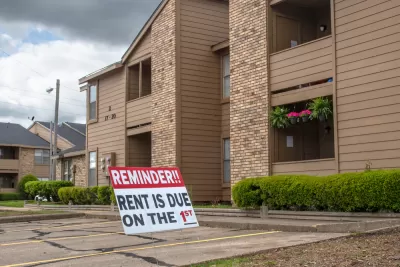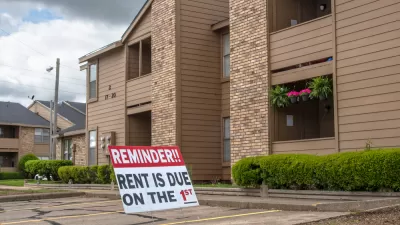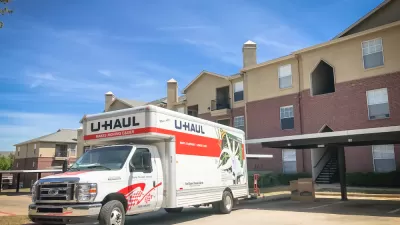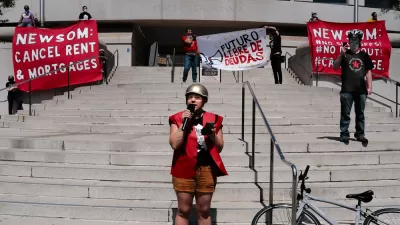The day that renters relying on public support to pay the bills have been dreading since March arrives tomorrow.

"A federal moratorium that has protected millions of renters from eviction since late March expires Friday [July 24], leaving millions of people at risk even as the coronavirus continues to spread across the country," reports Renae Merle.
"The moratorium covers renters who live in homes with federally backed mortgages, which the Urban Institute estimates to be 12.3 million households, or about 30 percent of all renters nationwide," according to Merle. "Once the moratorium lapses, landlords can give their delinquent tenants 30 days’ notice and then begin filing eviction paperwork in late August."
The article includes expert insight about the potential for the end of the moratorium to cause a wave of evictions and economic struggles in the country, adding to the evictions and housing insecurity already facing renters and property owners all over the country. The U.S. Department of Housing and Urban Development recently announced a housing toolkit to offer support for renters and property owners covered by the federal eviction moratorium, in anticipation of Friday's expiration date.
As noted by Merle, the U.S. House of Representatives approved $100 billion in renter relief as part of the Health and Economic Recovery Omnibus Emergency Solutions (HEROES) Act, which the Senate has yet to consider. "Last week, Sen. Kamala D. Harris (D-Calif.) unveiled a sweeping housing plan that would ban evictions and foreclosures for a year while giving tenants up to 18 months to pay back missed payments," according to Merle. Information about the legislation proposed by Senate Harris is available in an article by Katy O'Donnell.
FULL STORY: A federal eviction moratorium ends this week, putting 12 million tenants at risk

Alabama: Trump Terminates Settlements for Black Communities Harmed By Raw Sewage
Trump deemed the landmark civil rights agreement “illegal DEI and environmental justice policy.”

Study: Maui’s Plan to Convert Vacation Rentals to Long-Term Housing Could Cause Nearly $1 Billion Economic Loss
The plan would reduce visitor accommodation by 25% resulting in 1,900 jobs lost.

Why Should We Subsidize Public Transportation?
Many public transit agencies face financial stress due to rising costs, declining fare revenue, and declining subsidies. Transit advocates must provide a strong business case for increasing public transit funding.

Paris Bike Boom Leads to Steep Drop in Air Pollution
The French city’s air quality has improved dramatically in the past 20 years, coinciding with a growth in cycling.

Why Housing Costs More to Build in California Than in Texas
Hard costs like labor and materials combined with ‘soft’ costs such as permitting make building in the San Francisco Bay Area almost three times as costly as in Texas cities.

San Diego County Sees a Rise in Urban Coyotes
San Diego County experiences a rise in urban coyotes, as sightings become prevalent throughout its urban neighbourhoods and surrounding areas.
Urban Design for Planners 1: Software Tools
This six-course series explores essential urban design concepts using open source software and equips planners with the tools they need to participate fully in the urban design process.
Planning for Universal Design
Learn the tools for implementing Universal Design in planning regulations.
Smith Gee Studio
Alamo Area Metropolitan Planning Organization
City of Santa Clarita
Institute for Housing and Urban Development Studies (IHS)
City of Grandview
Harvard GSD Executive Education
Toledo-Lucas County Plan Commissions
Salt Lake City
NYU Wagner Graduate School of Public Service





























